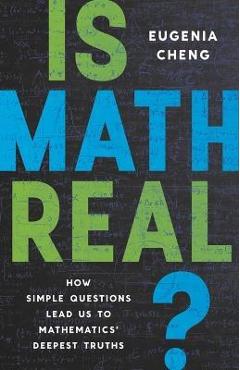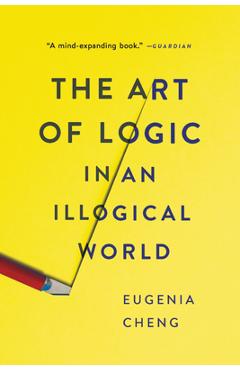X + Y: A Mathematician\'s Manifesto for Rethinking Gender - Eugenia Cheng

Detalii X + Y: A Mathematician\'s
libris.ro
156.24 Lei
173.6 Lei
Social Science
Eugenia Cheng
X + Y: A Mathematician\'s - Disponibil la libris.ro
Pe YEO găsești X + Y: A Mathematician\'s de la Eugenia Cheng, în categoria Social Science.
Indiferent de nevoile tale, X + Y: A Mathematician\'s Manifesto for Rethinking Gender - Eugenia Cheng din categoria Social Science îți poate aduce un echilibru perfect între calitate și preț, cu avantaje practice și moderne.
Preț: 156.24 Lei
Caracteristicile produsului X + Y: A Mathematician\'s
- Brand: Eugenia Cheng
- Categoria: Social Science
- Magazin: libris.ro
- Ultima actualizare: 05-06-2025 16:21:01
Comandă X + Y: A Mathematician\'s Online, Simplu și Rapid
Prin intermediul platformei YEO, poți comanda X + Y: A Mathematician\'s de la libris.ro rapid și în siguranță. Bucură-te de o experiență de cumpărături online optimizată și descoperă cele mai bune oferte actualizate constant.
Descriere magazin:
A brilliant mathematician examines the complexity of gender and society and forges a path out of inequality. Why are men in charge? After years in the male-dominated field of mathematics and in the female-dominated field of art, Eugenia Cheng has heard the question many times. In x + y, Cheng argues that her mathematical specialty -- category theory -- reveals why. Category theory deals more with context, relationships, and nuanced versions of equality than with intrinsic characteristics. Category theory also emphasizes dimensionality: much as a cube can cast a square or diamond shadow, depending on your perspective, so too do gender politics appear to change with how we examine them. Because society often rewards traits that it associates with males, such as competitiveness, we treat the problems those traits can create as male. But putting competitive women in charge will leave many unjust relationships in place. If we want real change, we need to transform the contexts in which we all exist, and not simply who we think we are. A brilliant mathematician examines the complexity of gender and society and forges a path out of inequality. Why are men in charge? After years in the male-dominated field of mathematics and in the female-dominated field of art, Eugenia Cheng has heard the question many times. In x + y, Cheng argues that her mathematical specialty -- category theory -- reveals why. Category theory deals more with context, relationships, and nuanced versions of equality than with intrinsic characteristics. Category theory also emphasizes dimensionality: much as a cube can cast a square or diamond shadow, depending on your perspective, so too do gender politics appear to change with how we examine them. Because society often rewards traits that it associates with males, such as competitiveness, we treat the problems those traits can create as male. But putting competitive women in charge will leave many unjust relationships in place. If we want real change, we need to transform the contexts in which we all exist, and not simply who we think we are. Praise for Eugenia Cheng Eugenia Cheng\'s] tone is clear, clever and friendly . . . she is rigorous and insightful. . . . She is] a lucid and nimble expositor. --- Alex Bellos, New York Times Book Review Dr. Cheng . . . has a knack for brushing aside conventions and edicts, like so many pie crumbs from a cutting board. --- Natalie Angier, New York Times A br

Produse asemănătoare

Cablu alarma 8 x 0.22 + 2 x 0.75 premium, cupru 100%, cod: I105ITLi-Y (ST)Y, made in Italy, utilizare pentru sisteme de alarma,
![]() 1cctv.ro
1cctv.ro
Actualizat in 06/11/2025
167.1 Lei

Cablu alarma 8 x 0.22 + 2 x 0.50 premium, cupru 100%, cod: I104IT Li-Y (ST)Y, made in Italy, utilizare pentru sisteme de alarma,
![]() 1cctv.ro
1cctv.ro
Actualizat in 06/11/2025
155.73 Lei

Cablu alarma 6 x 0.22 + 2 x 0.50 premium, cupru 100%, cod: I044IT, Li-Y (ST)Y, made in Italy, utilizare pentru sisteme de alarma
![]() 1cctv.ro
1cctv.ro
Actualizat in 06/11/2025
127.59 Lei

Cablu alarma 12 x 0.22 premium, cupru 100%, cod: I357IT, Li-Y(ST)Y, made in Italy, utilizare pentru sisteme de alarma, manta ext
![]() 1cctv.ro
1cctv.ro
Actualizat in 06/11/2025
146.03 Lei

Cablu alarma 10 x 0.22 premium, cupru 100%, cod: I103IT, Li-Y(ST)Y, made in Italy, utilizare pentru sisteme de alarma, manta ext
![]() 1cctv.ro
1cctv.ro
Actualizat in 06/11/2025
126.91 Lei

Cablu alarma 8 x 0.22 premium, cupru 100%, cod: I039IT, Li-Y(ST)Y, made in Italy, utilizare pentru sisteme de alarma, manta exte
![]() 1cctv.ro
1cctv.ro
Actualizat in 06/11/2025
112.74 Lei
Produse marca Eugenia Cheng

The Joy of Abstraction: An Exploration of Math, Category Theory, and Life - Eugenia Cheng
![]() libris.ro
libris.ro
Actualizat in 28/10/2025
111.32 Lei

Unequal: The Math of When Things Do and Don\'t Add Up - Eugenia Cheng
![]() libris.ro
libris.ro
Actualizat in 28/10/2025
178.56 Lei

Is Math Real?: How Simple Questions Lead Us to Mathematics\' Deepest Truths - Eugenia Cheng
![]() libris.ro
libris.ro
Actualizat in 28/10/2025
125.9 Lei

Is Math Real?: How Simple Questions Lead Us to Mathematics\' Deepest Truths - Eugenia Cheng
![]() libris.ro
libris.ro
Actualizat in 28/10/2025
167.4 Lei

The Joy of Abstraction: An Exploration of Math, Category Theory, and Life - Eugenia Cheng
![]() libris.ro
libris.ro
Actualizat in 28/10/2025
145.03 Lei

The Art of Logic in an Illogical World - Eugenia Cheng
![]() libris.ro
libris.ro
Actualizat in 28/10/2025
111.55 Lei